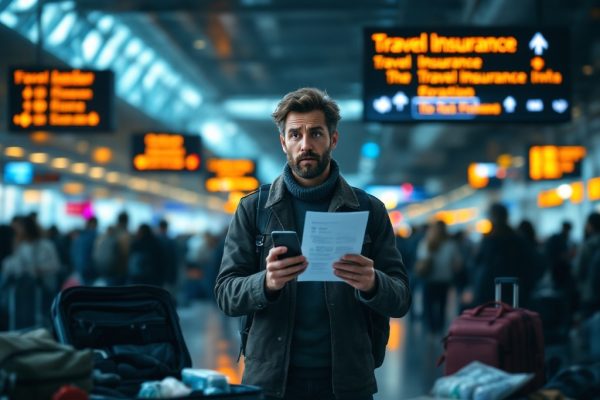Traveling Costs: How to Prepare
Dreaming of a getaway but worried about the costs? Discover how to plan your perfect trip without breaking the bank. This guide covers everything from estimating travel expenses, including flights, accommodation, and activities, to setting a daily budget and preparing for unexpected costs. Learn practical tips for saving money, like using public transport and booking in advance. Start planning your stress-free adventure today!
Important information

- Research your destination’s cost of living, typical prices for food, lodging, activities, and transportation to create a realistic budget.
- Factor in pre-trip expenses like flights, visas, travel insurance, and vaccinations, and set up an emergency fund for unexpected issues.
- Track your spending during your trip and adjust your budget as needed to stay on track and avoid overspending.
- Consider using budgeting apps, currency converters, and travel websites to help you plan and manage your expenses effectively.
- Save money by traveling during the off-season, using public transport, booking in advance, and taking advantage of free activities and deals.
Understanding Traveling Costs: Preparation Essentials
Planning a trip requires careful budgeting. First, determine your potential expenses. Consider your destination and trip length, as these significantly influence costs. Your travel style also matters; backpacking is far more economical than luxury hotels. Think about the activities you’ll enjoy, like museums, tours, and nightlife. Reviewing expenses from past trips can provide a realistic starting point.
Transportation
Flights, trains, and rental cars constitute a significant portion of your travel budget. Research and compare prices to find the most cost-effective options.
Accommodation
From cozy hostels to five-star hotels, your choice of accommodation greatly impacts your expenses. Consider your comfort level and budget when making your selection.
Food
Food costs can vary widely depending on your dining preferences. Will you indulge in restaurants, cook your own meals, or opt for a mix of both?
Activities
Don’t forget to budget for activities like tours, entrance fees, and other experiences. These costs can quickly accumulate.
Other Expenses
Factor in smaller expenses that can impact your overall spending, such as souvenirs, tips, and daily incidentals.
Travel Essentials
Research typical costs at your destination, considering currency exchange rates. Also, remember to budget for travel insurance and any applicable visa fees.
A well-planned budget ensures a stress-free trip, letting you fully enjoy your adventure.
What Influences Travel Budgets?
Several factors influence your travel expenses. Your destination plays a significant role. A bustling metropolis like Paris typically commands higher prices than a smaller town. Trip duration also matters. Longer stays naturally lead to greater costs. Your travel style contributes as well. Luxury accommodations and experiences will undoubtedly be more expensive than backpacking. Finally, consider your planned activities. Indulging in guided tours and fine dining will impact your overall budget. Careful planning is essential to manage your travel spending effectively.
Factors Influencing Travel Costs
- Destination: bustling cities often mean higher prices.
- Trip Duration: longer stays lead to increased expenses.
Spending Considerations
- Travel Style: luxury versus budget impacts overall costs.
- Planned Activities: tours and dining affect your budget.
Estimating Costs: Destination, Duration, and Style
Travel expenses depend significantly on your destination, trip length, and travel style. A luxurious extended stay in an expensive city will cost more than a short trip to a more affordable location with simpler accommodations. Researching the cost of living at your destination is crucial. This helps estimate daily expenses like food, transportation, and activities. For example, a week in Zurich, Switzerland, will be far more expensive than a week in Hanoi, Vietnam. This reflects the difference in their cost of living. Your travel style is also important. Backpacking across Southeast Asia is more budget-friendly than a luxurious Mediterranean cruise. Consider these three factors to create a realistic travel budget:
- destination,
- duration,
- travel style.
Planning Activities and Their Impact on Budget
Planning your activities is crucial for travel budgeting. Entrance fees for museums, parks, and historical sites can add up quickly, so factor those into your budget. Account for the costs of guided tours, excursions, and other entertainment. Transportation to and from these attractions also impacts your budget. Don’t forget to allocate funds for souvenirs.
Tips for Saving Money While Traveling
- Consider free activities like hiking or exploring local markets.
- Look for free events in the area, which can offer enriching experiences.
Budget Planning Essentials
- Factor in entrance fees for museums, parks, and historical sites.
- Include the costs of guided tours, excursions, and entertainment.
- Account for transportation expenses.
- Allocate funds for souvenirs.
Creating a Travel Budget: A Step-by-Step Guide
Planning a successful trip begins with creating a solid travel budget. This involves pre-trip planning, establishing an emergency fund, and managing expenses during your trip.
Start by creating a simple worksheet outlining potential costs. These costs may include accommodation, meals, transportation, activities, and incidentals.
Research typical prices at your destination to create a realistic budget. Check the average cost of meals, taxis, or other local transportation.
Before you leave, remember to factor in essential expenses. Flights, visas, and travel insurance are crucial pre-trip expenses. Most importantly, include an emergency fund for unexpected issues like medical emergencies or flight cancellations.
Budgeting continues throughout your trip. Track your spending on accommodation, food, activities, local transport, and souvenirs.
Be flexible and adjust your budget as needed to stay on track.
Budgeting for Major Travel Costs
Planning your trip budget requires a savvy approach. Consider these key factors:
Accommodation
Research typical costs for hotels or rentals, considering factors like location, amenities, and time of year.
Dining
Expenses can range from budget-friendly street food to upscale restaurants. Plan your meals strategically to balance enjoyment and cost.
Activities
Explore options from free walking tours and parks to paid attractions and experiences. Choose activities that align with your interests and budget.
Transportation
Evaluate the costs of public transit, taxis, or car rentals. Factor in fuel expenses and parking fees if applicable.
Incorporate these travel expenses into your overall budget for a well-planned trip.
Effective Tools and Strategies for Travel Budgeting
Managing travel costs is easier with budgeting tools and expense trackers that simplify spending oversight. Currency converters are also vital, helping you understand exchange rates for accurate budgeting. Travel blogs and websites provide helpful resources, including destination cost estimates. Combining these tools empowers travelers to plan effectively and stay within their budget. Here’s how you can manage your travel costs effectively:
Use budgeting tools and expense trackers. These tools simplify spending oversight and allow you to track your expenses in real-time.
Utilize currency converters. Understanding exchange rates is crucial for accurate budgeting. Currency converters help you convert currencies and understand the value of your money in different countries.
Consult travel blogs and websites. These resources provide helpful information, including destination cost estimates, which can assist you in planning your trip and managing your expenses.
By combining these tools, travelers can plan effectively and stay within their budget.
Monitoring Spending and Adapting Budgets
A daily budget helps control your spending. By monitoring your expenses against it, you’ll be better prepared for unexpected costs. Having a backup plan, like an emergency fund, or being flexible enough to adjust your plans can also be invaluable. Ultimately, planning ahead keeps you on track and provides peace of mind.
















